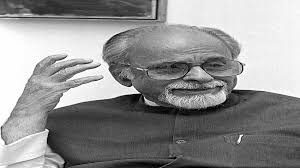I.K. Gujral (1919-2012)
Inder Kumar Gujral, commonly known as
I.K. Gujral, was an Indian politician and statesman who served as the 12th Prime Minister of India from April 1997 to March 1998. Born on December 4, 1919, in Jhelum district, which is now in Pakistan, Gujral was a distinguished diplomat and intellectual, known for his vision of a peaceful and harmonious South Asia.Early Life and Education:
Gujral was born into a Punjabi family in the town of Jhelum, which was then part of British India. His father, Avtar Narain Gujral, was a prominent Indian freedom fighter who was jailed several times by the British authorities for his activism. Gujral's mother, Pushpa Gujral, was a social worker and educationist.
After completing his schooling in Jhelum, Gujral moved to Lahore, where he enrolled at Hailey College of Commerce. However, his education was interrupted by the partition of India in 1947, which forced him and his family to move to India.
Political Career:
Gujral's political career began in the early 1950s when he joined the Congress party. He was first elected to the Rajya Sabha, the upper house of the Indian Parliament, in 1964. He was re-elected to the Rajya Sabha in 1976 and 1982.
In 1989, Gujral was appointed as the Minister of External Affairs in the government of Prime Minister V.P. Singh. He held this position until 1990 when Singh's government fell. Gujral was again appointed as the Minister of External Affairs in 1996 when the United Front government, led by H.D. Deve Gowda, came to power.
In April 1997, Gujral was elected as the Prime Minister of India by a coalition of political parties known as the United Front. During his tenure, Gujral focused on improving India's relations with its neighbors, particularly Pakistan. He introduced the "Gujral Doctrine," which called for India to take the initiative in building friendly relations with its neighbors, without expecting reciprocity. The doctrine also called for the resolution of all outstanding issues between India and its neighbors through peaceful means.
However, Gujral's tenure as Prime Minister was short-lived. In March 1998, his government lost a vote of confidence in the Parliament, and he was forced to resign.
Later Life:
After his resignation, Gujral returned to active politics and was appointed as the Minister of External Affairs in the government of Prime Minister Atal Bihari Vajpayee. He held this position from 1998 to 1999.
Gujral retired from active politics in 1999, but he remained active in public life. He wrote several books on politics and foreign policy, including "A Foreign Policy for India," "Matters of Discretion: An Autobiography," and "The Gujral Doctrine: My Views."
In recognition of his contributions to Indian politics and diplomacy, Gujral was awarded several honors and awards, including the Padma Vibhushan, India's second-highest civilian award, in 1976, and the Bharat Ratna, India's highest civilian award, in 2014, posthumously.
Death:
I.K. Gujral passed away on November 30, 2012, at the age of 92. His death was widely mourned by people from all walks of life, who remembered him as a statesman and intellectual who worked tirelessly for peace and harmony in South Asia.















No comments